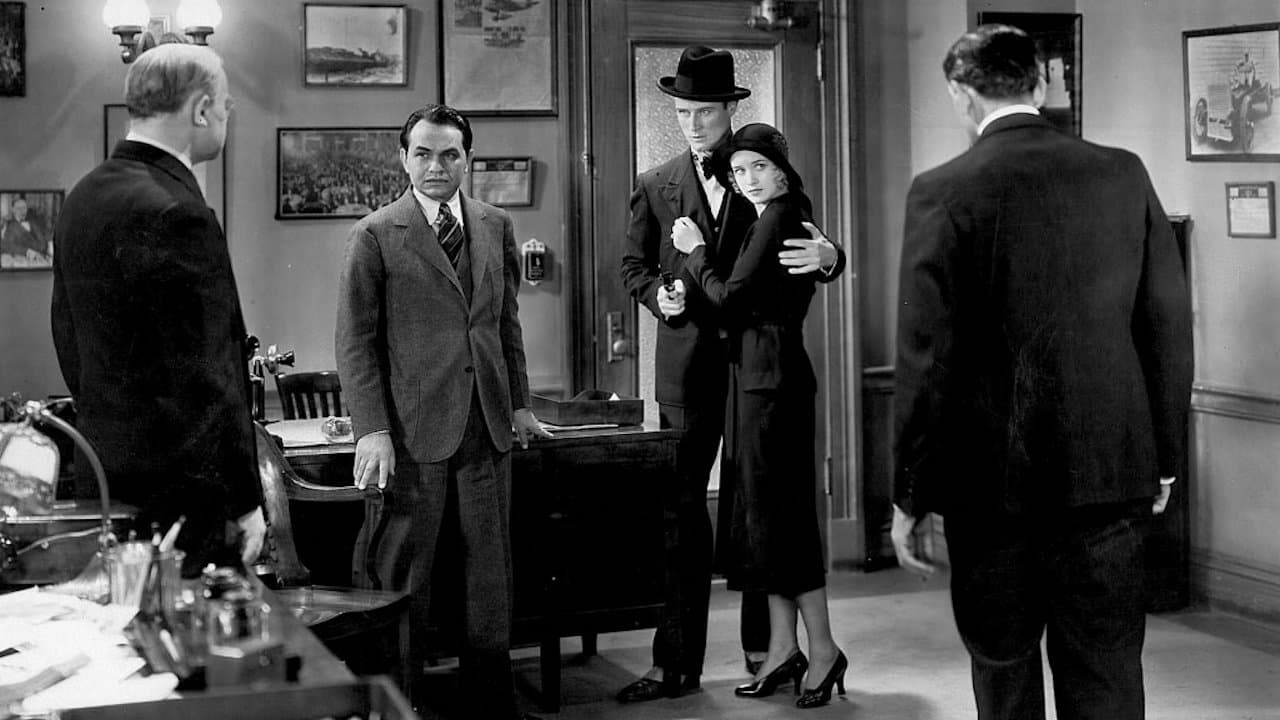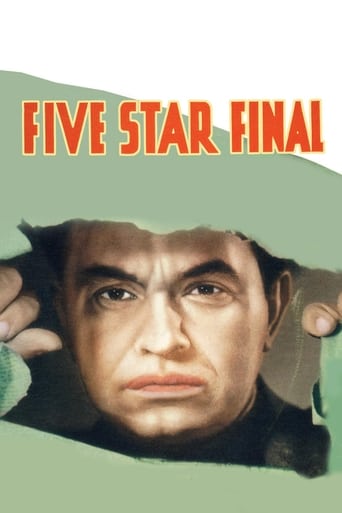

Brilliant and touching
... View MoreTells a fascinating and unsettling true story, and does so well, without pretending to have all the answers.
... View MoreOne of the best movies of the year! Incredible from the beginning to the end.
... View More.Like the great film, it's made with a great deal of visible affection both in front of and behind the camera.
... View MoreTypically fast-moving, bold Warners early talkie, helping cement its rep as the "socially conscious" studio, this is an indictment of tabloid journalism, focusing on an unscrupulous managing editor (Edward G. Robinson, superb) forced into an attack of conscience when the society wedding he's ordered an expose on--the mother of the bride murdered a boyfriend 20 years ago--results in a double suicide. Also typical of the studio, it's a tad too broad--the victimized family is just too nice, too perfect, and the murderous mom made too sympathetic. And the bride (Marian Marsh), when finally in a position to attack the paper, overacts. But it's a lively look at a hardy old form of journalism, with some excellent supporting performances--Boris Karloff as a deceitful reporter, the always-perfect Aline MacMahon as the secretary who loves boss Robinson--and a pretty realistic look at 1931, what with the speakeasies, the evening editions, the society pages. And the indictment of the tabloids hasn't dated a great deal; is what Rupert Murdoch does so very different?
... View MoreEdward G. Robinson works for a tabloid, that sensationalizes the news and cares more about its numbers of readers than having a dignified reputation. When it decides to run a story of "What Ever Happened to..." about a young pregnant lady who shot the father of her baby years ago, when he wouldn't marry her, the film shows how it affects the lady's current family. The case made headlines years ago, and it's a capital idea to write about it now, of course, because the readers want to know, have to know, really care about it. Costarring Aline MacMahon, as Eddie's secretary who's in love with him and Boris Karloff in a memorable role, this is one hard-hitting film, that pulls no punches. What's unique about it is that there's no music score. It begins and ends with the sound of the newspaper machines running. Its frank and brutal way of telling the story and fleshing out its character make this a film that you won't likely forget, especially with the speech made at the end of the film by the young daughter of the lady who shot her father. By the end, you may feel preached at, because it's not subtle, but that's the point of the film. That all actions have consequences, and that the heart of the story is the people, and that newspapermen have to show respect for their subject. Before Absence of Malice came Five Star Final telling a story that's timeless.
... View MoreContra Jesse Jackson, there are too many Christians in New York – but apparently not in the newspaper business.One can take this movie as a parable, only slightly exaggerated perhaps, of the entire "news" media.Although some of the dialogue is somewhat corny, by today's standards, anyway, much of the rest is chilling, or infuriating, or heart-breaking, by turns.Aline MacMahon, whose character told the messenger boy not to change his name, and followed with the line in the first paragraph, has one of her best roles, and she is terrific.Edward G. Robinson, as the managing editor, tells her she is the visible conscience, and he brings powerful emotion to his role.Marian Marsh has the movie-stealing scene, one of power and heartbreak and possibly her best performance in her three-decades-long career. You'll find her character justified even while you're urging her not to do what she threatens.There is a generally superb cast, including Boris Karloff, whose playing is – as usual – often over the top, but in his last scene, without words, he makes one wonderful move that deserves applause.Taken to task for a story that has given tabloid-sized "news" papers their tawdry reputation, and, in fact, made the very word "tabloid" a synonym for that kind of garbage, the publisher tries to say that papers transcend the individual.In other words, phooey on individuals; we want to boost circulation no matter who, or what, gets hurt.In truth, such publications, and, in fact, all the so-called mainstream "news" media have been all too willing to stomp on individuals and, in fact, on the entire country, in order to have a scoop, a ratings coup, or a jump in circulation.Granted, most wouldn't have stooped to quite the low of the paper in this story, but the ultimate end is not much different.It's been not quite 80 years since "Five Star Final," and daily papers are dying like the proverbial flies, all over the country – and many people are just nodding and saying "about time." Remember the period and the context, and pay close attention to "Five Star Final." It has something to say, and says it extremely well.
... View MoreThe exploitativeness of tabloids is always a good subject, even back in 1931. "Five Star Final" is about a ruthless editor (Edward G. Robinson) who hounds a woman involved in a 20-year-old murder with tragic results. The film sports a good cast, including Boris Karloff, Mae Marsh, Ona Munson, Aline McMahon, and H.B. Warner.Robinson, as the editor, decides to do a series on an old murder and track down one of the people involved, Nancy Vorhees. She is now married with a daughter about to get married. The film looks at the effect it has on the lives of everyone in the family.I am not as enthusiastic about this film as some of the posters here, though I imagine it was very hard-hitting for 1931. The acting is very melodramatic, and while I appreciated the devastating effects of the story, I really thought a bad situation was made much worse by the behavior of the girl's parents at the end of the film. It wasn't until the mid-thirties that the class system in America began to disintegrate, so it's still quite evident here, with the way the young woman's future in-laws react to the scandal and Robinson's analysis of black readers.At the time the film was made, any publicity was looked down upon - today it's considered a great thing, though I don't suppose involvement in a murder would be. You might get a book deal out of it, though, and a TV movie. Nancy Voorhees today could have given the paper an exclusive interview and become a sympathetic character. But it was such a disgrace, and people seemed to have no understanding or compassion.It's hard to judge the performances because the acting style and the dialogue are so different from even a few years later. Of all of them, Aline McMahon, as the cynical secretary, comes off the best.Definitely worth seeing.
... View More